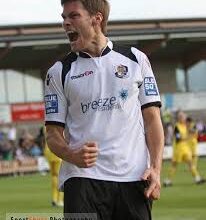Dylan Hartley: From Controversial Captain to Inspirational Leader

Introduction: The Making of a Relentless Competitor
Few figures in English rugby have divided opinion quite like Dylan Hartley. Fiercely competitive, brutally honest, and often misunderstood, Hartley’s journey from a determined young hooker in New Zealand to England’s captaincy embodies a story of resilience, leadership, and redemption. Known for his uncompromising style and fiery temperament, he led with heart and honesty, turning personal battles into lessons in mental toughness and team culture.
Early Life and Beginnings in Rugby
Born on 24 March 1986 in Rotorua, New Zealand, Dylan Hartley’s early years were shaped by the rugby culture that surrounded him. Though raised in a nation obsessed with the All Blacks, Hartley’s destiny lay across the world in England. His mother’s English heritage allowed him to qualify for the England national team, a decision that would define his professional career.
As a teenager, Hartley displayed raw passion and intensity on the pitch. His move to England to join the Worcester Warriors Academy marked the start of a new chapter. It wasn’t long before he transferred to Northampton Saints, where he found his true rugby home and grew into one of the Premiership’s most recognisable and respected figures.
Rise with Northampton Saints
Establishing Himself as a Hooker
When Hartley joined Northampton Saints in 2005, he was still developing his game. Over the next decade, he became one of the most consistent and reliable hookers in the English Premiership. His commitment to physicality, set-piece precision, and leadership made him indispensable to the Saints’ forward pack.
During his 14-year career at the club, Hartley made over 250 appearances, earning the captaincy and guiding Northampton through one of its most successful eras. Under his leadership, the Saints won the Premiership title in 2014, along with European Challenge Cup and Anglo-Welsh Cup honours.
Leadership on and off the Pitch
Hartley’s leadership style was direct, no-nonsense, and centred around accountability. He built team culture on respect and work ethic. Known for pushing his teammates to give everything, he expected the same from himself. His relentless pursuit of standards made him both respected and feared in the dressing room — a trait that would later define his England captaincy.
International Career: From Debut to Captaincy
Earning the Red Rose
Dylan Hartley made his England debut in 2008, and despite early challenges, his grit and consistency secured him a place in the national squad for more than a decade. Playing as hooker, he became a cornerstone of England’s set-piece dominance, known for his accurate line-out throwing and fearless scrummaging.
Appointed England Captain
In 2016, newly appointed England coach Eddie Jones shocked many by naming Hartley as England captain. Critics questioned the decision due to his long disciplinary record, but Jones saw beyond the controversies. He recognised Hartley’s ability to galvanise a squad and instil the standards England had been lacking.
The appointment proved to be a masterstroke. Under Hartley’s leadership, England achieved a Grand Slam in the 2016 Six Nations, their first in 13 years, and won a historic series in Australia the same year. His England side maintained one of the highest win ratios in modern rugby history — around 85% during his tenure.
Discipline and Controversy: The Other Side of the Coin
A Career Shadowed by Suspensions
Hartley’s career was as much about headlines as it was about heroics. Over the years, he accumulated multiple bans for on-field misconduct, totalling more than 60 weeks of suspension. Incidents included dangerous tackles, striking, and verbal abuse of officials.
However, these moments, while damaging to his reputation, shaped his character. He later admitted that many of his offences stemmed from an obsession with impact and aggression — qualities that, when controlled, made him a formidable leader.
Redemption through Leadership
What made Hartley’s story compelling was not the mistakes but how he learned from them. When handed the England captaincy, he channelled his intensity into discipline and mentorship. Younger players often spoke of his honesty and high expectations. He led by example, redefining what leadership meant in a modern rugby context — tough but fair, demanding but supportive.
Playing Style: Passion, Precision, and Power
The Hooker’s Role
As a hooker, Hartley combined technical proficiency with brute strength. His accuracy in the line-out, communication in the scrum, and fearless tackling made him vital in both attack and defence. He wasn’t the flashiest player on the field, but his consistency and tactical awareness were invaluable.
Mentality Over Talent
In interviews, Hartley often described himself as not the most naturally gifted athlete. Instead, he credited his career to mentality and work ethic. He believed that elite sport is as much about mindset as physical ability. His famous quote — “Every day was a game for me” — reflected his commitment to preparation and professionalism.
Injuries and Retirement
Battling the Body
The physical toll of professional rugby eventually caught up with Hartley. Years of scrummaging, collisions, and high-impact play led to persistent knee problems. In 2019, after ongoing medical consultations, he announced his retirement from professional rugby.
Though his playing days were over, Hartley’s voice in rugby remained influential. He continued to speak candidly about the mental challenges athletes face after retirement, including loss of identity and adjustment to life beyond the sport.
Health Challenges and Brain Injury Revelation
In recent years, Hartley has been open about the long-term effects of rugby on his body and mind. In 2025, he revealed he had been diagnosed with a traumatic brain injury, saying parts of his brain had “gone to sleep”. His admission sparked fresh discussion about player welfare and the future of contact sports.
Despite his health challenges, Hartley’s attitude remains one of resilience and acceptance. He has emphasised that while he would not change his career path, greater awareness and protection for players are essential for the sport’s future.
Life After Rugby: Mentorship and Media
Following retirement, Dylan Hartley transitioned into coaching, mentoring, and media work. His experience as England captain made him a valuable voice in understanding leadership dynamics within elite sport.
He has spoken at leadership conferences, contributed to rugby analysis, and become a role model for young athletes navigating career pressures. His authenticity — shaped by mistakes, successes, and honest self-reflection — continues to inspire players across the sporting world.
Legacy: The Evolution of a Modern Leader
Dylan Hartley’s career cannot be summed up by statistics or suspensions alone. His story represents growth, maturity, and the transformation of raw aggression into leadership. From a fiery young hooker to the captain who restored pride in English rugby, he demonstrated that leadership is not about perfection but about progress.
A Symbol of Grit and Redemption
Hartley’s journey shows that greatness in sport is often born from imperfection. His resilience in the face of criticism, willingness to learn from failure, and commitment to his teammates reflect the very qualities that define true champions.
Today, Dylan Hartley stands not just as a former England captain, but as a symbol of self-awareness, perseverance, and leadership through adversity. His evolution from controversy to credibility remains one of rugby’s most powerful and human stories.
Conclusion: Beyond the Game
Dylan Hartley’s legacy stretches far beyond Twickenham’s pitch. He is a reminder that leadership is forged through trial, that courage sometimes means facing your flaws, and that success often comes at a price.
Whether remembered for his fierce competitiveness or his transformative captaincy, one thing is certain — Dylan Hartley changed English rugby forever. His story continues to inspire both players and fans, proving that true strength lies not only in power and passion, but in the ability to grow, evolve, and lead with purpose.



